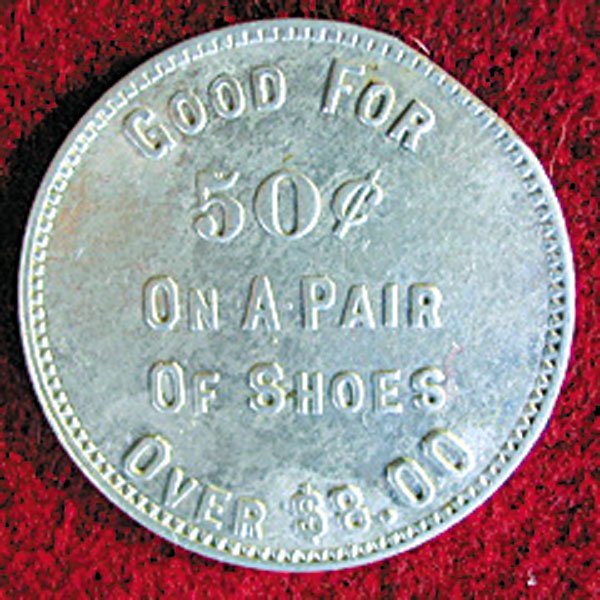Gilroy native Al Gagliardi shares his token collection with the
community
Gilroy – For Margaret Piedmont summer renders images of apricot slicing and bus rides. Nonchalantly, the Gilroy native says she was only 11 or 12 when she began working at the old Filice & Perrelli Canning Co. here.
“It brought us to school, it bought our shoes,” Piedmont said. “It did help us a lot.”
Child laborers were hidden in the back, but their employment was no secret. So many “country kids” worked in the canning factory during the summertime that eventually the business sent a bus to the farm territory to pick up the underage employees, Piedmont said.
The 91-year-old also remembers the unique way she earned her pay: with little tokens. Cannery workers were paid on a piecework basis, meaning they were handed tokens when a job was finished and at the end of the day they cashed in the chips.
Those tokens, once as interesting as a timecard, are now little pieces of Gilroy history, pieces that Al Gagliardi wants to preserve.
The retired Santa Clara County Sheriff’s Office deputy had handfuls of tokens, from the cannery and local merchants, in containers around his Gilroy home. When Gilroy began converting the old cannery into a mixed-use building, Gagliardi decided that it would be a good idea to conserve his collection and share it with the community.
“I was a collector of oddities and I just ran onto them somewhere and want to see if I can get the complete collection,” said the 81-year-old.
Gagliardi began going through the coins and pulling out one of each kind. Phillip Laursen, a local historian, has taken photos of the collection, which contains about 25 coins and 15 wooden nickels.
Gagliardi hopes that they’ll be incorporated into the cannery project or maybe displayed at the Gilroy Historical Museum. But the World War II veteran doesn’t care about name recognition.
“I’m just doing it for preservation of history,” he said.
A native Gilroyan, Gagliardi remembers the days when his hometown was known for canned tomatoes, peach and prune orchards, not outlets and a Wal-Mart Supercenter.
His family owned about 20 acres of prune orchards and his mother cut tomatoes, spinach, apricots, peaches and pears at the cannery, with all the other ladies. Gagliardi can still recall memories of his mother coming home with tokens in her pockets.
Although farming was the family business, Gagliardi wasn’t interested in making that his career.
“We had a farm and I was always confined to that and I wanted to see the world,” he said. “And when Uncle Sam called me, I thought ‘This is great.'”
Gagliardi was drafted into the U.S. Army and spent three years fighting in World War II. He moved back home to Gilroy in 1946, dabbled in prune farming, decided that “it was just a downward plight” and became a sheriff.
Homes now sit on the family’s former farm.
Piedmont, whose family owned a dairy on the land where the Pacheco Pass Shopping Center is now, also remembers a different Gilroy, when “the town was small.”
And, although she worked in the cannery even before hitting her teens, Piedmont relishes the memories.
“They were wonderful people to work for,” she said.














